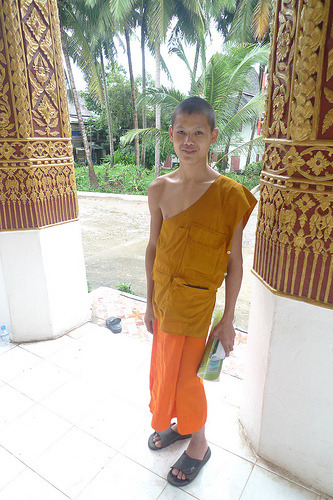
I was walking around yesterday when I came across a beautiful Wat (Buddhist temple or monastery) I forget the name but it was similar to the rest I have seen. There was a boy sitting near the entrance of the temple. He had an English Exercise book so I sat beside him and started to talk to him and help him with his grammar. The book was a photocopy of a text book produced by the Laotian Education Department.
The boy’s name is Boun Chanh. He is 16 years old and is studying at the temple. He is from the countryside in an area called Pak Ou a farming village two hours away from the city. He came to the temple 8 years ago and it is his last year before he has to leave. The temple only provides education for him until the age of 16. He lives in the temple and goes home for four weeks a year. Everything is provided free of charge but the temple is not as big or as wealthy as the other temples so at 16 he must leave.
His dream is to be a teacher or a lawyer. We went over the future tenses, past tenses which I used to talk about his past and his hopes for the future. He was studying since and for xx years to talk about his times at the temple. He was studying transitions (first, next, then..) to learn about his daily life. In all I spent about 4 hours sitting with him in the entrance of the temple. My mouth was getting a bit dry from talking too much so he took me to his room where I continued to teach him and talk. The room was extremely sparse. He sleeps on a board and has a drawing he made for the Laotian New Year in April. As I was teaching him, some more kids came in and sat and listened as I was teaching him then I started to talk and teach to the other kids who were coming in. They receded words and phrases to help with pronunciation.
He asked me if I wanted to come this morning at 3 am, when they bang the drums to begin the half moon festival. I said yes. They also walked around the city and collected alms (Buddhist monks collect sticky rice from the people to show their connection between the two worlds of the Wat and the people). He showed me how they prepare for the walk by having a special basket, told me what they say. The walk through the streets barefoot then after the return to the temple to chant, study and clean.
For him, coming to the temple was the only way he could ever get an education because there are no schools in his village. The village, he told me, is very basic with a bit of electricity but it is never stable. There is a stream so they have water. His brother will come to the temple next year but he will be gone. His family can’t afford tuition for college or for the next part of his life.
I promised to help him, like I did, for the rest of my time here. Sitting there talking to him was truly amazing and I am grateful for the chance to learn.